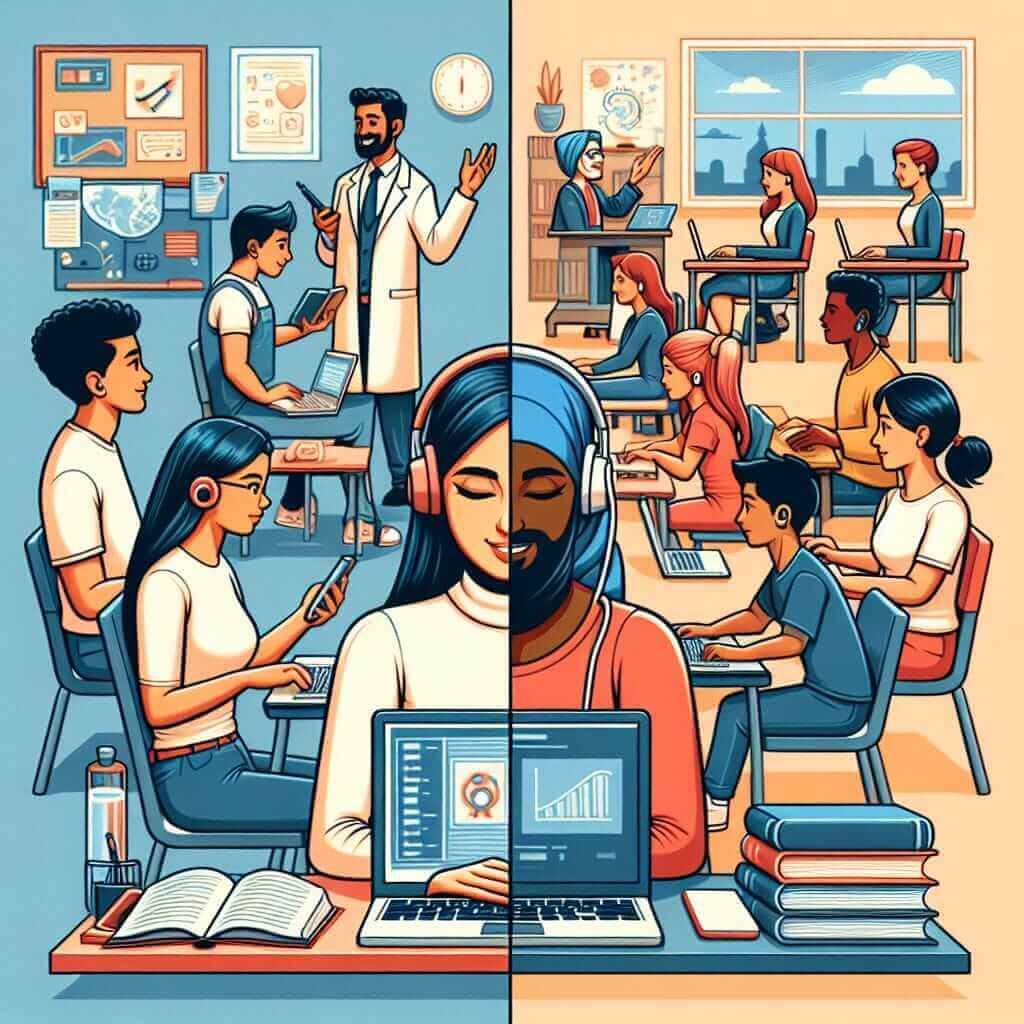The IELTS Reading test is designed to evaluate various reading skills, including reading for gist, reading for main ideas, reading for detail, skimming, understanding logical arguments, and recognizing writers’ opinions, attitudes, and purpose. One of the relevant and frequently discussed topics in recent years is the impact of online education on traditional schooling. This topic not only reflects current educational trends but also invokes critical thinking – essential for acing the IELTS Reading section. Given the surge in online education due to the global pandemic, the likelihood of encountering a similar topic in future IELTS exams is relatively high.
Main Content
Reading Passage: The Implications of Online Education for Traditional Schooling
Medium Text
Online education has grown significantly over the past decade, fundamentally challenging the landscape of traditional schooling. Various factors contribute to this shift, including technological advancements, accessibility, and the flexibility offered by online education models. This increasing trend raises several questions about the long-term implications for conventional educational systems.
One of the primary benefits of online education is the flexibility it provides to students. Unlike traditional schooling, where students have to adhere to a fixed schedule, online courses allow learners to study at their own pace and convenience. This is particularly beneficial for working professionals and individuals with other commitments. Furthermore, online education eliminates geographical barriers, enabling access to world-class educational resources regardless of location.

However, there are concerns regarding the quality and effectiveness of online education compared to traditional schooling. Critics argue that online education lacks the personal interaction and engagement that in-person classes offer. This interaction is crucial for developing social skills, collaborative learning, and building relationships, which are important aspects of traditional education.
Another significant implication is the potential for a digital divide. Not all students have equal access to the necessary technologies and high-speed internet required for effective online learning. This can create disparities in educational opportunities and outcomes, particularly affecting students from low-income families.
Additionally, the shift towards online education poses challenges for teachers and institutions. Traditional teaching methods need to be adapted for digital platforms, requiring educators to develop new skills and competencies. This transition also involves significant financial investments in technology and infrastructure, which may not be feasible for all institutions.
In conclusion, while online education presents numerous advantages and opportunities, it also introduces challenges and limitations that need to be addressed. The future of education may likely involve a hybrid model, combining the benefits of online and traditional schooling to provide a more comprehensive and inclusive learning experience.
Questions
Multiple Choice
-
What is one of the primary benefits of online education mentioned in the passage?
a. More expensive courses
b. Flexible study schedules
c. Limited access to resources
d. Fixed examination dates -
What concern is raised about online education’s effectiveness?
a. Lack of geographical barriers
b. Insufficient personal interaction
c. Overcommitment for students
d. Lack of technological advancement -
What challenge is mentioned for teachers in the transition to online education?
a. Need to develop new skills
b. Decrease in students’ feedback
c. Increased travel time
d. Reduced salary
True/False/Not Given
-
Online education allows students to study at their own pace. (True/False/Not Given)
-
All students have equal access to the necessary technology for online learning. (True/False/Not Given)
-
The passage suggests a hybrid model combining online and traditional education in the future. (True/False/Not Given)
Answer Key
- b. Flexible study schedules – The passage states that online education allows learners to study at their own pace and convenience.
- b. Insufficient personal interaction – The passage mentions critics argue that online education lacks the personal interaction and engagement that in-person classes offer.
- a. Need to develop new skills – The passage notes that traditional teaching methods need to be adapted for digital platforms, requiring educators to develop new skills and competencies.
- True – The passage indicates that online education allows learners to study at their own pace and convenience.
- False – The passage highlights concerns about the digital divide and unequal access to necessary technologies.
- True – The passage concludes with the possibility of a hybrid model combining online and traditional schooling.
Common Mistakes to Avoid
- Ignoring Context: Always read the surrounding sentences to understand the context fully.
- Overlooking Details: Pay attention to specific details that can alter the meaning of a passage.
- Misinterpreting Statements: Differentiate between direct statements, implications, and the author’s opinion.
Vocabulary
- Fundamentally (adv) /ˌfʌn.dəˈmen.t̬əl.i/: In a basic and important way.
- Flexibility (n) /ˌfleks.əˈbɪl.ə.t̬i/: The ability to adapt or be adapted to many different functions or activities.
- Geographical (adj) /ˌdʒi.əˈɡræf.ɪ.kəl/: Relating to geography.
- Disparities (n) /dɪˈspær.ə.tiz/: A great difference.
- Inclusive (adj) /ɪnˈklud.sɪv/: Including all the services or items normally expected or required.
Grammar Focus
- Relative Clauses: “One of the primary benefits of online education is the flexibility it provides to students.”
- Passive Voice: “This interaction is crucial for developing social skills.”
Tips For High Reading Score
- Practice Regularly: Consistent practice helps in understanding the test format and improving speed and accuracy.
- Vocabulary Building: Enhance your vocabulary to better comprehend passages.
- Develop Skimming and Scanning Skills: Efficiently identify key information without reading every word.
- Understand Question Types: Familiarize yourself with different question formats like multiple choice, true/false/not given, etc.
By following these guidelines and practicing diligently, you can significantly improve your performance in the IELTS Reading test. Good luck with your preparation!